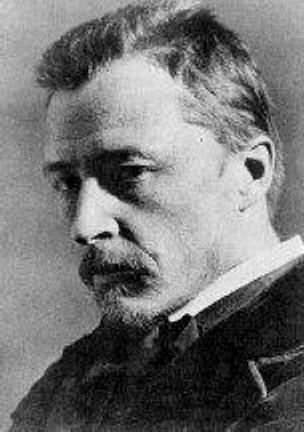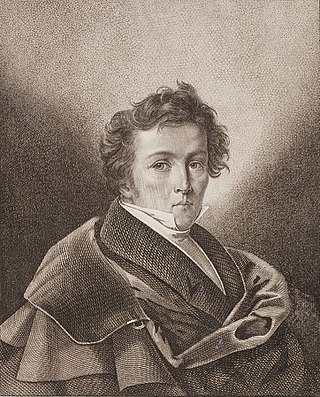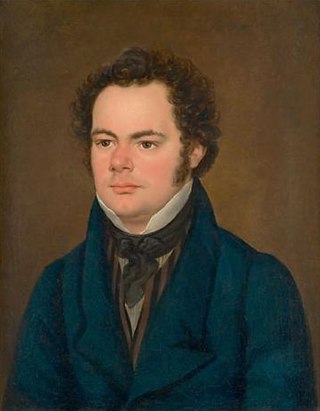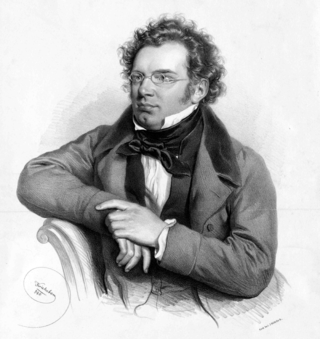Related Research Articles

Franz Peter Schubert was an Austrian composer of the late Classical and early Romantic eras. Despite his short life, Schubert left behind a vast oeuvre, including more than 600 secular vocal works, seven complete symphonies, sacred music, operas, incidental music, and a large body of piano and chamber music. His major works include the art songs "Erlkönig", "Gretchen am Spinnrade", and "Ave Maria"; the Trout Quintet; the Symphony No. 8 in B minor (Unfinished); the Symphony No. 9 in C major (Great); the String Quartet No. 14 in D minor ; the String Quintet in C major; the Impromptus for solo piano; the last three piano sonatas; the Fantasia in F minor for piano four hands; the opera Fierrabras; the incidental music to the play Rosamunde; and the song cycles Die schöne Müllerin, Winterreise and Schwanengesang.

Hugo Philipp Jacob Wolf was an Austrian composer, particularly noted for his art songs, or Lieder. He brought to this form a concentrated expressive intensity which was unique in late Romantic music, somewhat related to that of the Second Viennese School in concision but diverging greatly in technique.
A song cycle is a group, or cycle, of individually complete songs designed to be performed in sequence, as a unit.

Johann Ludwig Wilhelm Müller was a German lyric poet, best known as the author of Die schöne Müllerin (1823) and Winterreise (1828). These would later be the source of inspiration for two song cycles composed by Franz Schubert.

Otto Erich Deutsch was an Austrian musicologist. He is known for compiling the first comprehensive catalogue of Franz Schubert's compositions, first published in 1951 in English, with a revised edition published in 1978 in German. It is from this catalogue that the D numbers used to identify Schubert's works derive.
Susan Kaye McClary is an American musicologist associated with "new musicology". Noted for her work combining musicology with feminist music criticism, McClary is professor of musicology at Case Western Reserve University.

Winterreise is a song cycle for voice and piano by Franz Schubert, a setting of 24 poems by German poet Wilhelm Müller. It is the second of Schubert's two song cycles on Müller's poems, the earlier being Die schöne Müllerin.

Schwanengesang (Swan Song), D 957, is a collection of 14 songs written by Franz Schubert at the end of his life and published posthumously:
- Liebesbotschaft (text: Ludwig Rellstab)
- Kriegers Ahnung (Rellstab)
- Frühlingssehnsucht (Rellstab)
- Ständchen (Rellstab)
- Aufenthalt (Rellstab)
- In der Ferne (Rellstab)
- Abschied (Rellstab)
- Der Atlas (Heinrich Heine)
- Ihr Bild (Heine)
- Das Fischermädchen (Heine)
- Die Stadt (Heine)
- Am Meer (Heine)
- Der Doppelgänger (Heine)
- Die Taubenpost (alternative: D 965a) (Johann Gabriel Seidl)
Wolfgang Holzmair is an Austrian baritone.
David Willison is an English pianist. Between 1961 and 1999 he was the regular accompanist of the baritone Benjamin Luxon in recitals and recordings.

In the Western classical music tradition, Lied is a term for setting poetry to classical music to create a piece of polyphonic music. The term is used for any kind of song in contemporary German and Dutch, but among English and French speakers, lied is often used interchangeably with "art song" to encompass works that the tradition has inspired in other languages as well. The poems that have been made into lieder often center on pastoral themes or themes of romantic love.
Franz Schubert's Wiegenlied"Schlafe, schlafe, holder süßer Knabe", D 498, Op. 98, No. 2, is a lullaby composed in November 1816. The song is also known as "Mille cherubini in coro" after an Italian language arrangement for voice and orchestra by Alois Melichar.

Johann Baptist Mayrhofer was an Austrian poet and librettist. He is best known for his close friendship with the composer Franz Schubert.

Franz Schubert's best known song cycles, like Die schöne Müllerin and Winterreise are based on separate poems with a common theme and narrative. Other song cycles are based on consecutive excerpts of the same literary work: Schubert's "Ave Maria" is part of such a song cycle based on excerpts of the same poem, in this case by Walter Scott.

"Ständchen", D 889, is a lied for solo voice and piano by Franz Schubert, composed in July 1826 in the village of Währing. It is a setting of the "Song" in Act 2, scene 3 of Shakespeare's Cymbeline. The song was first published by Anton Diabelli in 1830, two years after the composer's death. The song in its original form is relatively short, and two further verses by Friedrich Reil were added to Diabelli's second edition of 1832.
Mitsuko Shirai is a Japanese mezzo-soprano and music professor.

"Das Wandern ist des Müllers Lust" is the first line of a poem by Wilhelm Müller, written in 1821 with the title "Wanderschaft" as part of a collection, Die schöne Müllerin. While wandern is defined as "hiking" today, it referred to the required journeyman years of craftsmen when written, in this case of a miller.
Hertha Klust was a German pianist.
Arnold Feil was a German musicologist and academic scholar.
References
- ↑ Dame, Marketing Communications: Web | University of Notre. "Susan Youens". Department of Music. Retrieved 2024-08-29.
- ↑ Two early allusions to Celestina, Charlotte Stern, 09 Jan 2021, Vol. 12, Iss: 2, pp 61-64
- ↑ Susan Youens, Heinrich Heine and the Lied (Cambridge: Cambridge University Press, 2007).
- ↑ "Irish Research Council - Harrison Medal | Society for Musicology in Ireland". musicologyireland.com. Retrieved 14 April 2020.